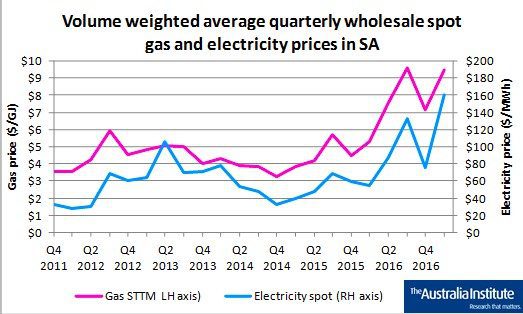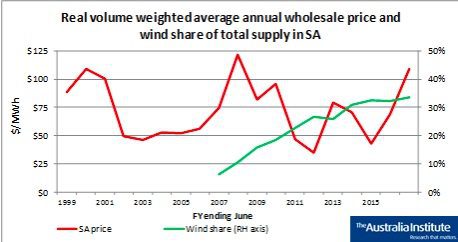14th July 2017
State energy ministers are threatening to “go it alone” with a clean energy target, as they ramp up pressure on the Coalition government, which is fracturing from the hard right response to the Finkel Review and the prospect of a growing share of wind and solar power.
The debate over clean energy sank to a new low when the head of the Coalition’s environment and energy committee warned that “people would die” from the increased costs imposed by renewable energy, earning a sharp rebuke from Labor.
The states made it clear on Thursday that if the federal energy minister Josh Frydenberg was unable to commit to a clean energy target at Friday’s COAG meeting, then they would look to establish one themselves, and would commission the Australian Energy Market Commission to study how this might be done.
“Enough is enough,” South Australia energy minister Tom Koutsantonis said. “The federal government must endorse chief scientist Alan Finkel’s recommendation to implement a market mechanism that drives investment in new generation, or the States will do it for them.
“The only thing standing in the way of lower prices, improved grid security and meeting our carbon reduction commitments is a divided federal Liberal Party that is completely beholden to the coal lobby.”
The states, energy companies, the market operator and consumer groups are pleading for the government to show some policy leadership, but although it has committed to 49 out of 50 recommendations for the Finkel Review, it has baulked at the CET.
Frydenberg admitted this week it was because the “internal processes” had not been finalised. This is a clear reference to the push back by conservatives within the Coalition and outside commentators, on everything from clean energy to clean cars, and even battery storage.
Craig Kelly, the climate-science denying head of the Coalition’s environment and energy committee, was on ABC Radio on Thursday morning blaming renewable energy for the recent electricity cost increases, when it is clear to everyone else that it is the fault of rising gas prices, and market gaming by the big generators.
“People will die,” Kelly said. “It’s because of policies we have which push up the price of electricity … there are $3 billion paid in subsidies for renewable energy. that pushes up prices of energy for the consumer.”
Little matter that numerous reports, including those commissioned by the Abbott government, found that renewable energy policies had minimal impact on consumer bills, and significantly reduced wholesale prices.
But the conservatives are determined to push back against anything that means change – including against wind farms and solar panels, and railing against battery storage, clean energy targets, and even vehicle efficiency standards, despite the obvious savings for consumers.
The Australia Institute released yet another report on Thursday which found, as many have before it, that the biggest impact on electricity prices was not wind energy, but the rising cost of gas.
It said this is particularly true of South Australia, the state with the highest proportion of wind energy (near 50 per cent). The TAI said the state had always experienced high wholesale prices because of its reliance on gas, even before wind energy had a major presence.
Resources minister Matt Canavan, like Kelly a strong supporter of new government-funded coal fired generators, attracted ridicule when he responded to Queensland’s newly announced zero emissions target for 2050 by tweeting: Stop trying to save the planet.”
Professor Ross Garnaut last week noted how wind energy was pushing prices down in the state, and when wind power was strongest, the prices averaged either very low or in negative territory.
However, noted last week that, although the ability to do that has been reduced in recent weeks by the introduction of a new rule that requires more gas generators to run as more wind is produced. The industry does not expect this to be a long-term requirement, however.
The Labor states have high renewable energy target ambitions. South Australia has already met its 50 per cent renewable energy target, nearly a decade early, Victoria is aiming for 40 per cent by 2025, while Queensland and the Northern Territory are both pushing for 50 per cent by 2030.
The ACT is on track for 100 per cent renewables by 2020, and the new Labor government has lifted the drawbridge in WA with some 1,000MW of large-scale wind and solar queuing for grid approvals after an effective ban in the last three years.
If Frydenberg was hoping for sympathy from the one Coalition government on the mainland, NSW, then he will be disappointed, with that state’s energy minister Don Harwin late last month outlining the sort of climate and clean energy vision once expected from prime minister Malcolm Turnbull.
There is a theory that Turnbull, having satisfied his ego by lasting longer as PM than the man he displaced, Tony Abbott, might then consider his longer term legacy by finally pursuing some of the climate and clean energy policies he espoused as the former opposition leader, and dumping those he once described as “bullshit”.
(Hear our podcast with Labor’s climate spokesman Mark Butler on this issue).
That anniversary – of lasting longer than Abbott – comes on September 12. But Kelly’s remarks, along with those in the Murdoch media in recent weeks, suggest the Hard Right might prefer to lose power than see their government encourage things as awful as clean energy, modern grid with battery storage and efficient cars.
The Finkel Review outlines a pathway to 42 per cent renewable energy through the CET, but any target hardened by a real commitment to the Paris climate deal will inevitably result in a much greater share of wind and solar energy. This appears all too much for the conservatives.
Deputy prime minister Barnaby Joyce, who got out a shovel for a sod-turning ceremony for a solar farm this week, said he would support a CET if it resulted in new coal plants. He also expressed his support for nuclear energy and “big new dams along the coast”.
Queensland energy minister Mark Bailey said the federal Coalition was “an absolute rabble” when it came to energy.
“The federal policy around the RET (renewable energy target) finishes in 2020,” Bailey told ABC’s Radio National breakfast program. “When it comes to lead-in times for energy infrastructure, that’s a blink of an eyelid. We need to get on with this, give certainty to replace this old kit that is coming out of system.
“If the federal government is not going to get on with it, then it might be up to the states again to drive energy policy.”
Bailey said he had held discussions with Victoria energy minister Lily d’Ambrosio about approaching the AEMC on getting a state-based clean energy target, and South Australia is also clearly on board. D’Ambrosio told The Guardian that the delays were “appalling”.
“The time to act is now,” said Koutsantonis. “Australian households and businesses cannot be held hostage by the impotence of the federal Liberal government.”



